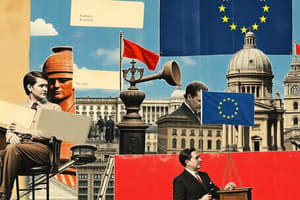Podcast
Questions and Answers
Vilket av följande påståenden beskriver en utmaning för EU:s framtid?
Vilket av följande påståenden beskriver en utmaning för EU:s framtid?
- Att upprätthålla ekonomisk stabilitet. (correct)
- Att öka antalet medlemsstater.
- Att minska regleringen av nationella lagar.
- Att öka enhetligheten i medlemsländerna.
Hur påverkar EU-medlemskap ofta nationella politiska beslut?
Hur påverkar EU-medlemskap ofta nationella politiska beslut?
- Det medför krav på att följa EU:s regler och standarder. (correct)
- Det leder till färre EU-föreskrifter.
- Det skapar helt oberoende nationella policyer.
- Det gör att medlemsländer kan ignorera internationella avtal.
Vilken faktor påverkar ofta åsikterna om EU inom medlemsstaterna?
Vilken faktor påverkar ofta åsikterna om EU inom medlemsstaterna?
- Ökad globalisering av företag.
- Gemensamma utbildningssystem.
- Ekonomiska skillnader mellan medlemsländer. (correct)
- Enhetlighet i språk och kultur.
Vad är en av de kontinuerliga processerna för att säkerställa EU:s effektivitet?
Vad är en av de kontinuerliga processerna för att säkerställa EU:s effektivitet?
Vilket av följande problem är en del av debatterna kring EU:s struktur?
Vilket av följande problem är en del av debatterna kring EU:s struktur?
Vilken institution i EU är ansvarig för att representera medborgarna?
Vilken institution i EU är ansvarig för att representera medborgarna?
Vilken institution fastställer den övergripande politiska riktningen för EU?
Vilken institution fastställer den övergripande politiska riktningen för EU?
Vilken av dessa institutioner föreslår lagstiftning i EU?
Vilken av dessa institutioner föreslår lagstiftning i EU?
Vilken institution har befogenhet att tolka och säkerställa tillämpningen av EU-lag?
Vilken institution har befogenhet att tolka och säkerställa tillämpningen av EU-lag?
Vilken av följande institutioner består av ministrar från respektive medlemsstat?
Vilken av följande institutioner består av ministrar från respektive medlemsstat?
Vad är en av de främsta funktionerna för Europaparlamentet?
Vad är en av de främsta funktionerna för Europaparlamentet?
Vilken institution är den verkställande grenen av EU?
Vilken institution är den verkställande grenen av EU?
Vilken institution har ansvar för att godkänna lagar som diskuteras av Europaparlamentet?
Vilken institution har ansvar för att godkänna lagar som diskuteras av Europaparlamentet?
Flashcards
EU:s institutioner
EU:s institutioner
EU:s olika organ som fattar beslut och ser till att EU:s lagar efterlevs.
Europeiska rådet
Europeiska rådet
EU:s ledamöter diskuterar och beslutar om övergripande politiska mål och riktningar.
Europeiska parlamentet
Europeiska parlamentet
Direktvalda representanter som representerar EU-medborgarna. De är viktiga för lagstiftningen.
EU:s enskilda marknad
EU:s enskilda marknad
Signup and view all the flashcards
EU:s budget
EU:s budget
Signup and view all the flashcards
Europeiska kommissionen
Europeiska kommissionen
Signup and view all the flashcards
EU:s medlemskap
EU:s medlemskap
Signup and view all the flashcards
Rådet för Europeiska unionen
Rådet för Europeiska unionen
Signup and view all the flashcards
EU:s domstol
EU:s domstol
Signup and view all the flashcards
EU:s struktur
EU:s struktur
Signup and view all the flashcards
EU:s medlemsstater
EU:s medlemsstater
Signup and view all the flashcards
EU-politik och nationella lagar
EU-politik och nationella lagar
Signup and view all the flashcards
Ekonomiska skillnader
Ekonomiska skillnader
Signup and view all the flashcards
EU:s framtid
EU:s framtid
Signup and view all the flashcards
Immigration och EU
Immigration och EU
Signup and view all the flashcards
Suveränitet i EU
Suveränitet i EU
Signup and view all the flashcards
Study Notes
Introduction to the EU
- The European Union (EU) is a political and economic alliance of 27 European countries.
- It has its own institutions with powers delegated by member states.
- The EU seeks to promote peace, values, and improve the living standards of its citizens.
Key Institutions
- European Parliament: Represents the citizens of the EU. Members are directly elected. Plays a crucial role in legislation.
- European Council: Composed of Heads of State or Government from each member state. Defines the EU's overall political direction and priorities.
- Council of the European Union: Composed of government ministers from each member state. Approves laws discussed in the European Parliament.
- European Commission: The EU's executive body. It proposes legislation, manages EU policies, and enforces EU law. Operates independently of member state interests.
- Court of Justice of the European Union: Interprets EU law and ensures its application across all member states. Has the power to settle legal disputes between member states and institutions.
Key Functions and Powers
- Legislation: The EU creates laws that apply to all member states. These laws cover various areas, including the single market, environmental protection, and social policies.
- Budgetary Control: The EU has a budget that is financed by member state contributions and used to fund various programmes and policies.
- Common Policies: The EU has developed common policies in a variety of areas including agriculture, fisheries, competition, and environmental protection.
- Justice and Home Affairs: The EU coordinates member states' work in these areas, addressing challenges like crime and immigration.
- External Relations: The EU has a role in international relations, negotiating trade agreements and representing its members in global forums.
The EU's Single Market
- A key pillar of the EU is its single market.
- This allows for the free movement of goods, services, capital, and people across most EU member states.
- The elimination of trade barriers fosters economic growth and integration within the EU.
Membership and Expansion
- Membership in the EU involves fulfilling certain criteria and negotiating the terms of accession.
- The EU's enlargement over the years has significantly increased its size and scope of influence. This process remains complex.
- Continued membership requires adherence to existing laws and regulations.
Challenges and Criticisms
- Ongoing debates exist involving the EU's structure and effectiveness.
- Variations in opinions exist among member states regarding certain policies or decisions.
- Issues like economic disparities between member states, immigration, and sovereignty debates continue to influence opinions.
EU's Influence on Member States
- EU membership often impacts national policies and political decision-making within member states.
- The need to align with EU regulations and standards impacts national laws and administrative structures.
- The coordination of common policies among member states can affect regulatory frameworks within each country.
EU's Future Prospects
- Challenges to the EU's continued success include maintaining economic stability, managing varied interests among member states, and navigating evolving political landscapes.
- Member state participation and integration remains crucial for continued effectiveness and the development of common goals.
- Maintaining public support and addressing concerns across member states is a continuous process.
Studying That Suits You
Use AI to generate personalized quizzes and flashcards to suit your learning preferences.




